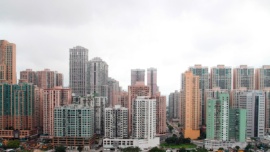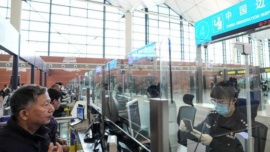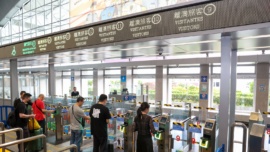Macau Business magazine | November 2020
To cope with a multibillion budget deficit, the Government will need to fall back on the city’s robust reserves again. Some 26.5 billion patacas will be allocated. Will that be enough? It all depends on the gaming revenue, which authorities expect will reach 130 billion patacas.
Uncertainty is the name of the game for 2021, as small businesses and livelihoods feel the heat. The stakes are high for the Policy Address.
With the help of gaming revenue and the whopping tax income received after the liberalisation of the gaming industry, drafting the annual budget year after year has so far been a no-brainer for the Macau SAR Government. The government has been able to make better use of the fiscal surplus and change the public’s perception that they were spendthrifts.
But the coronavirus pandemic has pushed the authorities into uncharted waters when it comes to drafting next year’s budget. Not only does the administration have to navigate through economic uncertainties and challenges, but it also has to promptly address the demands of the people, who have been used to justify an array of entitlements supported by the government’s expenditure.
Macau is now under “relatively great financial pressure”, Chief Executive Ho Iat Seng plainly stated while describing the current situation of the city last month. “As the pandemic persists, the gaming revenue and the government revenue remain at a low level, but there are many recurring expenses like payrolls to civil servants and expenditures in the areas of social welfare, education, and healthcare,” he told the media on October 1, Chinese National Day, adding that the government planned to dip into its fiscal reserve again for an additional MOP 20 billion (US $2.5 billion) to cover necessary expenses for the remainder of the year.
The latest figures from the Financial Services Bureau (DSF) show that the total government current revenue between January and September amounted to only MOP 33.51 billion, plunging by nearly 66 per cent from the same period a year ago. The decline was particularly owed to the lacklustre performance of the direct gross gaming revenue tax, which in general accounts for at least 70-80 per cent of the government revenue. Macau levies a 39 per cent tax rate on the casino gaming revenue, including a 35 per cent direct tax and other types of levies for social and welfare purposes.
In the first nine months of this year, according to DSF, gaming tax receipts totalled just MOP 23.41 billion, shrinking by 72.7 per cent year-on-year, as the gross gaming revenue contracted by 82.5 per cent year-on-year to MOP 38.61 billion in the January-September period due to the lower number of visitors during the pandemic (the data on gaming tax receipts and gross gaming revenue in the same time frame might not be aligned, as there might be days or weeks of delay between the revenue generated and the tax collected by the government). In the first three quarters of 2020, the tax revenue deriving from the gaming sector only represented 46.8 per cent of the amount that the government forecasted for the whole year in the annual budget revised in April, and 23.83 percent of the forecast made in the original 2020 budget before the pandemic hit.
Government expenditure totalled nearly 61.88 billion in the January-September period this year, up by 8.4 per cent from the same period a year earlier, the DSF data said. In spite of the plummeting revenue, the city still managed to record a fiscal surplus of MOP 16.30 billion in the first three quarters of 2020 on paper, thanks to the MOP 38.95 billion which the administration took from its fiscal reserve in April for the purposes of pandemic prevention and financial relief. Without the injection from the fiscal reserve, the budget deficit for the first nine months this year was close to MOP 30 billion.
Assuming the current expenses continue to account for about 85 percent of total government expenditure next year while direct gaming revenue tax take up about 70-80 percent of government revenue, the annual gaming revenue for next year has to be between MOP173.04 billion and MOP197.76 billion for the government to achieve a balanced budget.
Recovery?
“It’s not really an easy question for the government to answer”, says Macau-based economist José Luís de Sales Marques talking about how the authorities should prepare next year’s budget. “A lot of mechanics have to be considered in terms of both strategic and political aspects.”
The foremost is whether there will be any significant improvements in the local economy and gaming industry next year leading to sufficient government income. “It seems the future is uncertain, as visitation data from the National Day Golden Week in October was below expectations”, Mr Sales Marques says. Visitors arrivals to Macau between October 1 and 8 this year only amounted 156,300, representing a plunge of 86 per cent from the same period a year ago, despite the resumption of the Individual Visit Scheme (IVS) scheme and Mainland Chinese tour groups being allowed back in since the end of September. “Even if [visitation to Macau] has started picking up again, there are still other uncertainties — for instance, whether there will be any changes in the behaviour of gaming [patrons] — for the local economy”, the economist continues.
It will take time for the global economy, including the Macau market, to fully recover. Brokerage JP Morgan Securities (Asia Pacific) Ltd said in a recent research report that the Macau gaming revenue will only get back to normal — MOP 291.2 billion recorded in 2019 — in 2022. Though Macau is expected to recover faster than some other gaming jurisdictions, international rating agency Fitch also noted in a recent report that the city’s gaming market would only achieve full recovery in 2023, expecting the 2021 revenue to match just about 81 per cent of 2019 levels.
Assuming that next year the gaming revenue could rake in 81 per cent of what was achieved in 2019, according to Fitch — an optimistic scenario, judging from the current market fundamentals — the direct gaming tax revenue the Macau government could collect in 2021 would total MOP 82.56 billion, enough to cover the average annual government expenses incurred in the past few years. According to the calculations based on the DSF data, the authorities spent on average MOP 79.81 billion a year between 2015 and 2018.

10 per cent cut
Should the economic recovery remain sluggish, or should the government plan to spend more on financial relief or stimulus next year (the total budgeted expense for this year is MOP 109.64 billion), the authorities will have to fall back on its fiscal reserve again. As of the end of August this year, data published on the Official Gazette show that the assets of the fiscal reserve totalled over MOP 609.28 billion. “While the government could fall back on the fiscal reserve, the question is how much more is the government willing to draw from the fiscal reserve? There must be a certain line that it doesn’t want to cross”, says Mr Sales Marques. “As there are still so many uncertainties, prudence is the key [for the government to compile next year’s budget].”
The government has not yet revealed any forecast for next year’s budget, which will only be included in the Policy Address for 2021 scheduled to be unveiled later this month. But officials have confirmed that there is no plan to further cut down expenses, after the Chief Executive ordered in June that all government departments cut down 10 percent of their current expenses — including payrolls to civil servants, subsidies, and financial assistance for associations, entities, and individuals, and other types of expenses — from the amount predicted for 2021 in the 2020 original budget.
The original 2020 budget forecast the current expenses for the year to be MOP 81.71 billion, accounting for close to 85 percent of the total budgeted government expenses; a 10-percent cut will likely bring the level of the expenses for next year to MOP 73.54 billion. Assuming the current expenses continue to account for about 85 per cent of the total government expenditure next year, while direct gaming revenue tax take up about 70-80 percent of the government revenue, the annual gaming revenue for next year has to be between MOP 173.04 billion and MOP 197.76 billion in order for the government to achieve a balanced budget. This means the casinos here have to generate MOP 14.42-16.48 billion per month next year, a level the city’s gaming industry was able to achieve since 2010 before the pandemic hit, and a significant improvement from the average monthly tally of MOP 4.29 billion recorded between January and September this year.
“But there is really not much room for the government to cut its expenses as it has to roll out measures to support the economic recovery and public livelihoods,” says Edmund Loi Hoi Ngan, an associate professor from the Macau Polytechnic Institute
Visionary
Another scholar also calls for caution as economic recovery citywide and globally is “less than ideal” at the moment. “But there is really not much room for the government to cut its expenses, as it has to roll out measures to support the economic recovery and public livelihood”, says Edmund Loi Hoi Ngan, an associate professor at the Social, Economic and Public Policy Research Centre of the Macau Polytechnic Institute, adding that the government might need to draw from the fiscal reserve again next year.
He states, for instance, that the government will likely continue to bump up its capital expenditure to support the city’s gross domestic product (GDP) in the absence of gaming revenue and private investments, after launching a lot of public works projects to support local businesses and ensure local employment. “The administration needs to be visionary and invest in projects that could benefit the city in the long run such as public housing, major infrastructure, 5G infrastructure, and anti-flood prevention [in low-lying areas], rather than in road pavement and repair projects as shown in some cases this year”, the scholar illustrates. “There should also be better supervision over the projects to ensure the jobs created are filled up by as many locals as possible to ensure local employment.”
There is also not much room for cuts in the social welfare area, given the dominant position of associations in the territory. Mr Loi remarks: “The regular subsidies for the wide range of associations here also have to be maintained at a certain level to maintain the normal operation of the society.” DSF data show that the subsidies and financial assistance provided by the authorities to associations, entities, and individuals are the government’s main sources of expenses each year, totalling MOP 54.48 billion and accounting for over half of the total expenses in the original 2020 budget.
“Also, like the annual cash handout, which has different purposes throughout the years – from serving as financial relief for the public during the financial crisis [in 2008-09], to sharing economic fruits with residents, to helping the public tackle the soaring inflation – the government could further polish and refine the scheme, but it has to be continued next year in this current economic climate”, the academic adds.

MOP 26.5 billion to close the gap
The Government predicts that the city’s gaming industry will generate some 130 billion patacas in gross gaming revenue in 2021, signalling a jump from this year’s dismal performance, but still insufficient to prevent authorities from digging into the fiscal reserve. The budget law proposal submitted to the Legislative Assembly includes an allocation of 26.5 billion patacas from the SAR’s MOP 600 billion financial reserves. This comes after the Government made use of 60 billion patacas of the reserve to cover the expenditure in 2020.
The Government budget proposal also keeping the annual cash handout unchanged at 10 thousand patacas for permanent residents, and the tax exemptions and rebates adopted in recent years, while civil servants will not see any salary increase.
On the other hand, the Government will carry out the annual 7,000 money injection in each permanent resident’s non mandatory central provident account.
2021 Budget proposal
Government Revenue: MOP96 billion
Government Expenditure: MOP95.2 billion
Gaming Gross Revenue: MOP130 billion
Cash handout
Permanent and non-permanent residents have been receiving a certain amount of money from the government each year — MOP 10,000 and MOP 6,000 respectively this year — via the cash handout programme, more officially known as the Wealth Partaking Scheme, since its inception in 2008. For years, there have been talks to review the scheme, but making any changes has proven to be too controversial for the authorities.
On October 1, Mr. Ho suggested that the handout scheme might not continue next year, saying the government had to study the matter, and ruled out the possibility to offer a third round of financial relief measures for the public to tackle the economic impacts caused by the pandemic. A total of MOP 7.11 billion was budgeted this year for the cash handout, accounting for 6.5 per cent of this year’s budgeted expenses, while the first two rounds of financial reliefs amounted to at least MOP 13.6 billion, including MOP 10 billion backed by the Macau Foundation, an autonomous public fund set up by the government.
But these mere suggestion — the government testing the waters — has caused public disapproval, including that of local pro-establishment, grassroots associations. In various meetings held between the Chief Executive and representatives from prominent local associations in the past few weeks for the preparation of next year’s Policy Address, one of the major demands from groups like the Macau Federation of Trade Unions and the General Union of Neighbourhood Associations of Macau was the “continuation” and “consolidation” of the array of measures so far implemented to improve the livelihoods of residents.
“There are still a lot of factors affecting the willingness of Mainland Chinese to travel to Macau at the moment, and it’s difficult to predict when the local tourism market and economy will recuperate”, says legislator Leong Sun Iok from the Macau Federation of Trade Unions, the city’s largest labour group. “Thus, the government should keep a series of welfare measures in place next year, including cash handout, subsidies for water and electricity bills, and so forth, to alleviate the financial pressure of residents in this bad economic climate.”
“In view of the economic conditions, the government should also promptly roll out the third round of financial relief measures to boost the economy and ensure local employment”, he adds.


Mounting pressure
These all seemingly forced the Chief Executive to make a U-turn. On another public occasion in late October, Mr Ho stressed that the cash handout would continue next year, with no reduction in the amount, adding that there might be a third round of financial relief measures should the economic climate remain grim in 2021. Acknowledging that the government was “under pressure”, he added they would cautiously utilise public coffers, including the money of the fiscal reserve, as we do not know how long the pandemic will last.
Legislator Antonio Ng Kuok Cheong, in contrast, thinks that there is room for the government to further reduce its expenses next year apart from the 10-percent cut in current expenses, namely subsidies and financial assistance for local associations. “The point is that a further cut will cause strong contention among the stakeholders and how much more pressure the government is willing to bear”, he says.
Since the city’s top job is picked by a 400-member election committee composed of political elites and heavyweights from local associations in different segments every five years, the lawmaker notes: “The Macau Chief Executive is not elected by popular vote, so he has to rely on the support of the prominent local associations.”
























